How to Maintain Your Commercial Kitchen Equipment for Long Term Use?- A Complete Guide
As the owner of a commercial kitchen, it’s essential to protect and maximize your investment. One of the most effective ways to achieve this is through proper maintenance of your Commercial kitchen equipment. Regular upkeep not only extends the life of your appliances but also ensures a smooth, hygienic, and efficient kitchen operation.
Here’s your complete guide to maintaining your commercial kitchen setup.
Benefits of Regular Equipment Maintenance:
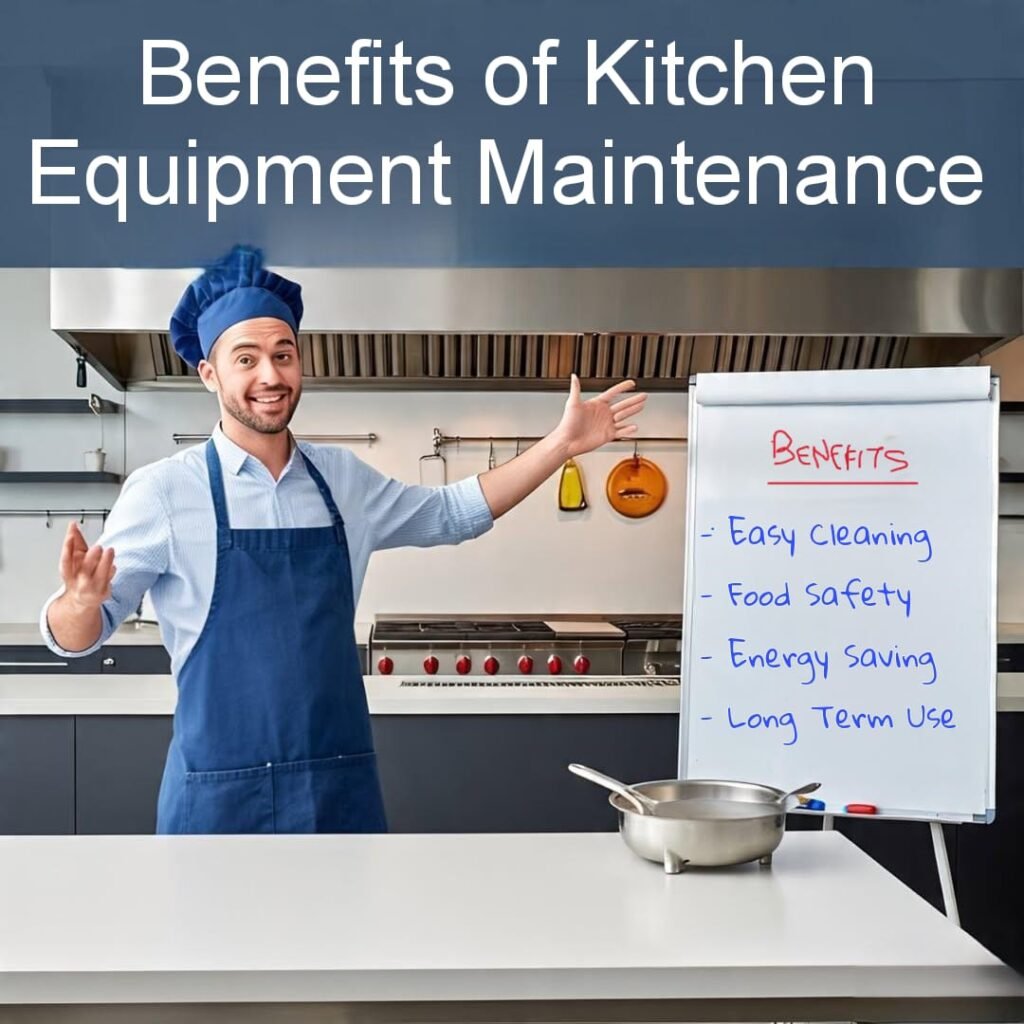
- Reduces breakdowns and costly repairs
- Increases equipment efficiency and lifespan
- Ensures food safety and hygiene compliance
- Saves energy and lowers utility costs
- Maintains consistent food quality and service
Types of Commercial Kitchen Equipment:
- Hot Equipment – Gas Ranges, Burners, Ovens, stoves, grills, fryers, etc.
- Preparation Equipment – Mixers, slicers, grinders, cutters, etc.
- Exhaust Hood – Ventilation systems for removing smoke, grease, and heat.
- Work Tables & Sink – Stainless steel workstations, washing and prep sinks.
- Service Equipment – Food warmers, dispensers, and Dining Tables, Display counters, Bain Maries etc.
- Cold Equipment – Refrigerators, freezers, saladettes, under-counter chillers.
- Bakery Equipment – Dough mixers, proofers, deck ovens, sheeters, etc.
- Dishwashing Equipment – Dishwashers, glass washers, and related stations.
Detailed List of Kitchen Equipment
General Maintenance Tips:
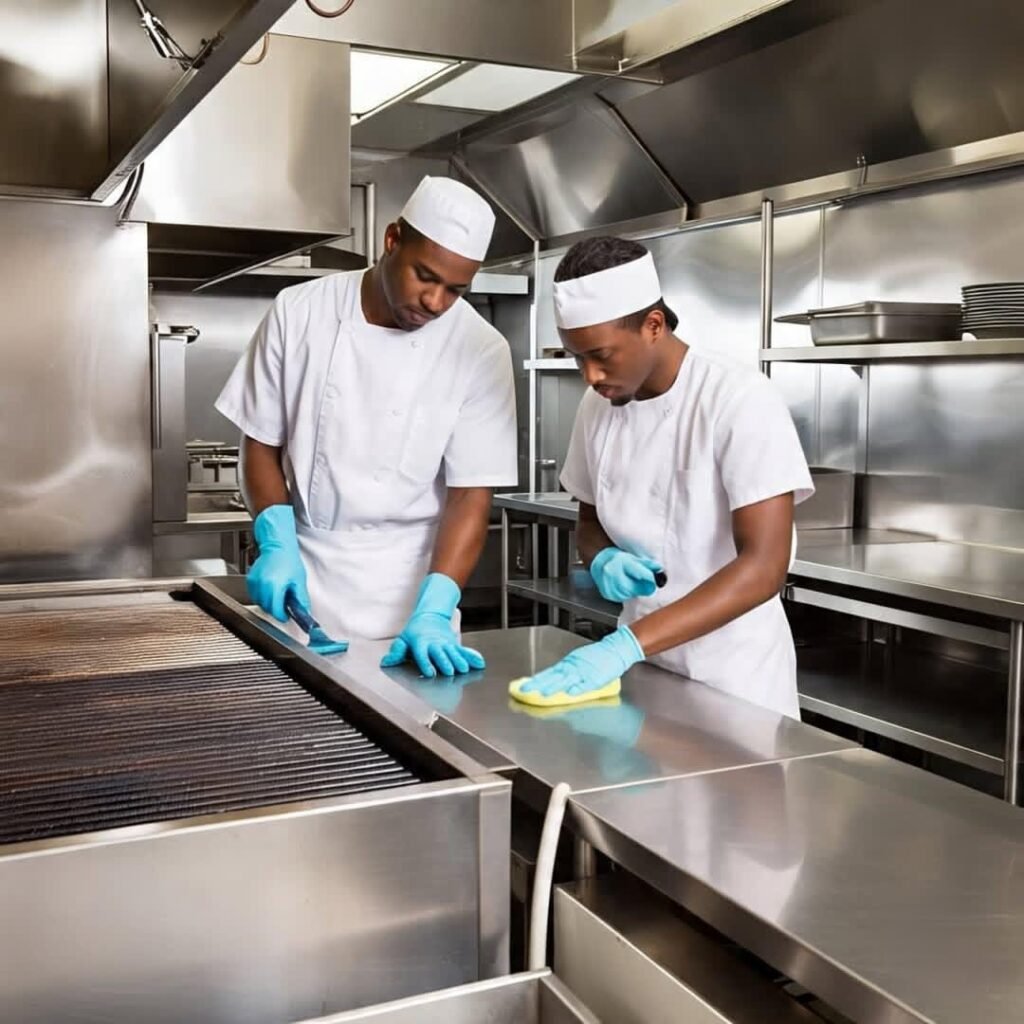
- Daily Cleaning: Clean all equipment used during the day thoroughly. Wipe down surfaces, remove residue, and sanitize where necessary. Pay close attention to moving parts and areas that come in direct contact with food. Use a food-safe commercial kitchen cleaner designed for stainless steel and heavy grease buildup.
- Timely Servicing: Schedule regular preventive maintenance with a certified technician to avoid breakdowns and ensure all equipment runs at optimal performance.
- Water Quality: Since many appliances are made of stainless steel, hard or salty water can cause scaling and corrosion. Always use soft water during cleaning and operations.
- Use of Water Softeners: Install water softeners if your area has hard water. This helps prevent buildup in dishwashers, steamers, and combi ovens, ultimately extending their lifespan.
Tips & Tricks for Maintenance – Equipment-Specific
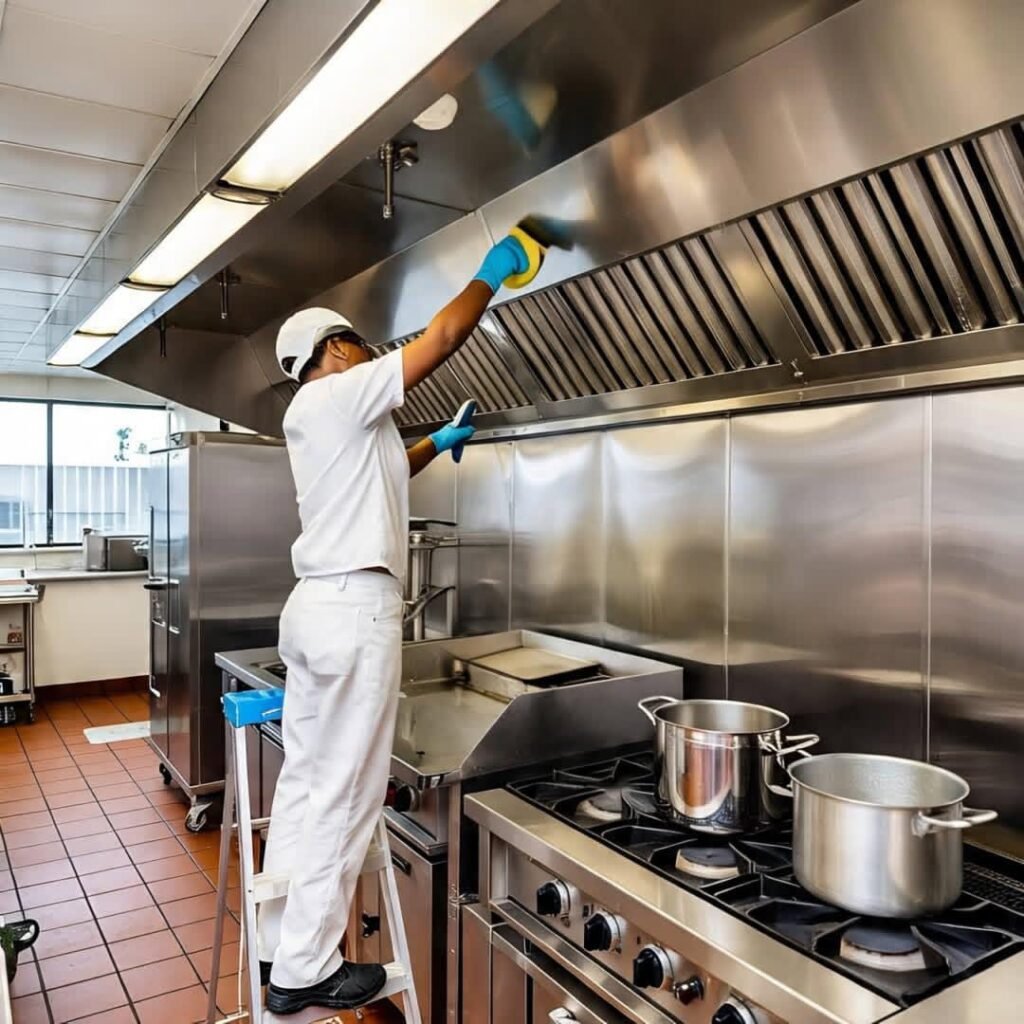
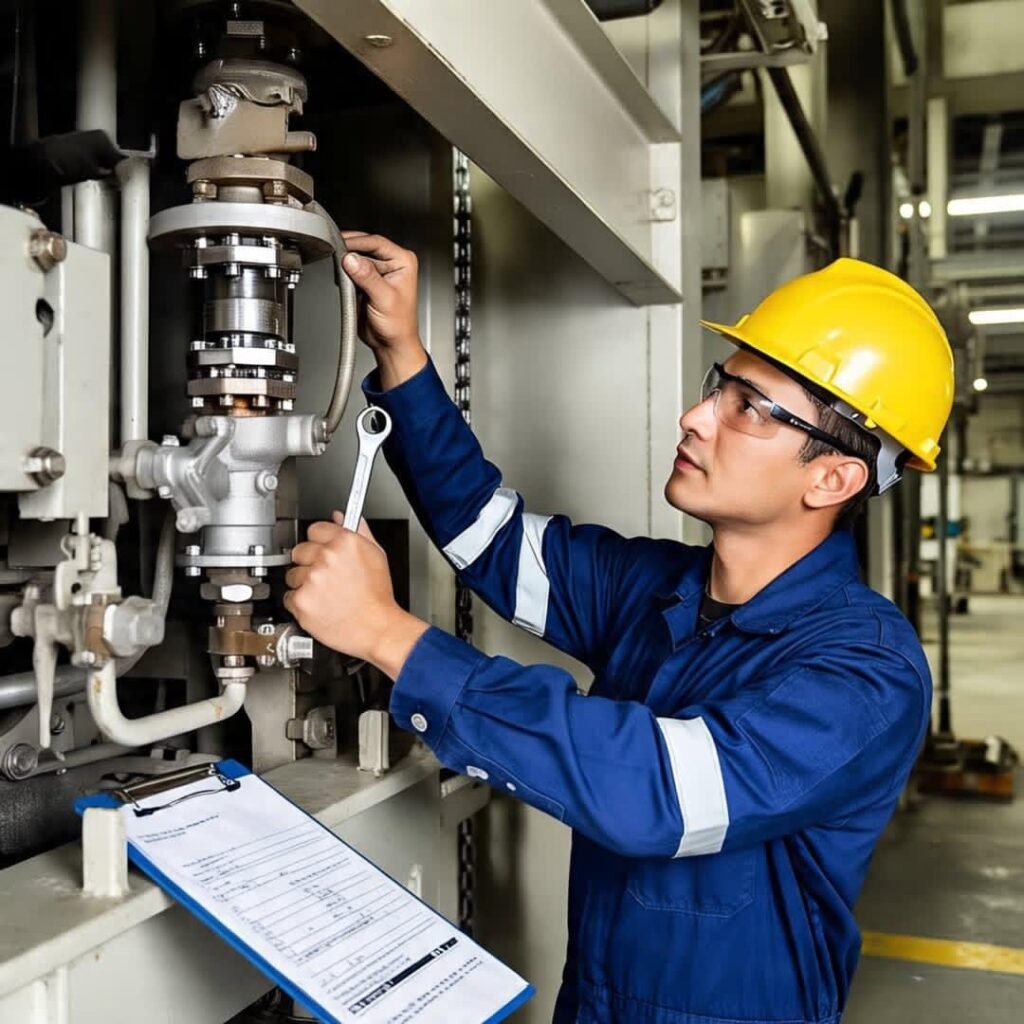
1. Hot Equipment
- Clean burners and heating elements regularly to ensure even heat distribution.
- Check gas connections for leaks and proper flow.
- For fryers, filter and replace oil frequently to maintain food quality and reduce residue buildup.
2. Preparation Equipment
- After each use, dismantle and wash parts that come into contact with food.
- Lubricate moving parts like gears or blades as per the manufacturer’s guidelines.
- Store in a dry place to avoid moisture damage and contamination.
3. Exhaust Hood
- Clean grease filters weekly to avoid fire hazards.
- Schedule professional deep cleaning of ductwork every 3 – 6 months depending on usage.
- Check fan belts and motor performance monthly.
4. Work Tables & Sink
- Wipe down with a soft cloth and mild detergent after each use.
- Avoid using abrasive cleaners to protect stainless steel finish.
- Regularly check for clogs in sinks and keep drains clear.
5. Service Equipment
- Inspect heat lamps and food warmers for bulb functionality.
- Clean sneeze guards and serving trays daily.
- Ensure smooth operation of warming drawers and bain-maries.
6. Cold Equipment
- Clean condenser coils every month for efficient cooling.
- Ensure gaskets are sealing properly to prevent energy loss.
- Defrost regularly (if not automatic) to maintain performance.
7. Bakery Equipment
- Clean mixers and dough hooks after every batch to prevent hardening of dough.
- Lubricate bearings and shafts as per schedule.
- Avoid water exposure to electronic control panels on ovens.
8. Dishwashing Equipment
- Descale regularly to prevent limescale buildup.
- Clean spray arms and filters after each shift.
- Run empty cycles with cleaner/disinfectant at least once a week.
Common Mistakes to Avoid in Equipment Maintenance
Even with good intentions, neglecting small details or cutting corners can shorten the life of your equipment or lead to safety issues. Here’s what to watch out for:

1. Skipping Regular Maintenance
- Waiting until equipment breaks down increases costs and downtime.
- Preventive maintenance is cheaper than emergency repairs.
2. Using the Wrong Cleaning Products
- Acidic or abrasive cleaners can damage stainless steel and rubber seals.
- Always use manufacturer-recommended products.
3. Ignoring Minor Issues
- Small leaks, strange noises, or slow heating can be early warning signs.
- Fix them early to prevent major malfunctions.
4. Not Cleaning Behind/Under Equipment
- Grease and food particles accumulate in hard-to-reach places, attracting pests and creating fire hazards.
5. Overloading Equipment
- Dishwashers, mixers, and slicers have load limits. Exceeding them causes faster wear and potential breakage.
6. Forgetting to Check Filters & Vents
- Dirty air filters in hoods or clogged condenser coils in refrigerators reduce efficiency and increase fire risks.
7. Using Untrained Staff for Repairs
- Only qualified technicians should handle complex issues.
- DIY fixes by untrained staff can void warranties or worsen the problem.
Monthly/Quarterly Maintenance Checklist
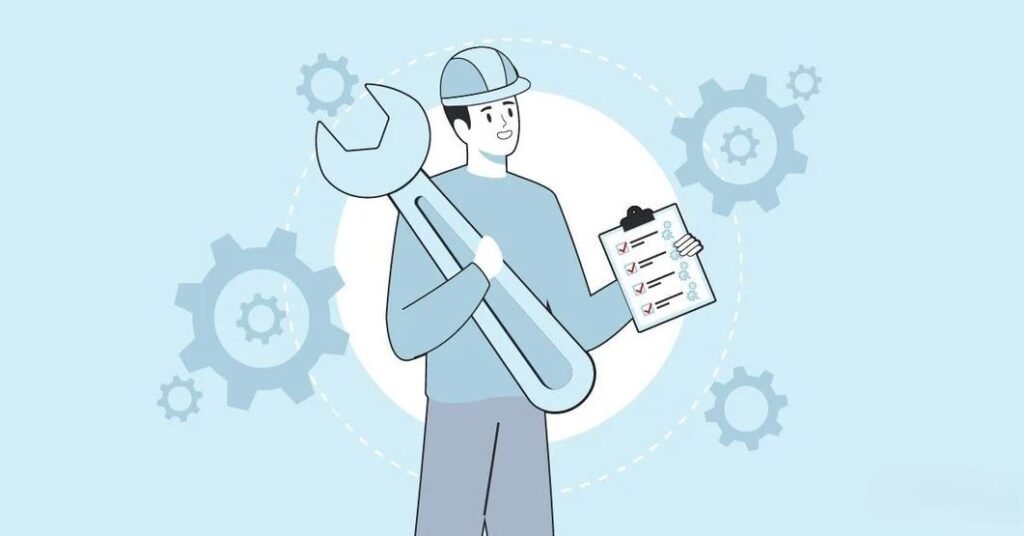
- Daily: Cleaning, wiping, sanitizing, emptying waste
- Weekly: Checking filters, cleaning coils, inspecting gaskets
- Monthly: Lubricating parts, checking thermostats, exhaust cleaning
- Quarterly: Professional servicing, full system audits
Take Care Today, Save Tomorrow
Proper maintenance of your commercial kitchen equipment isn’t just good practice—it’s smart business. By following routine cleaning schedules, using the right tools, and avoiding common mistakes, you can extend the life of your kitchen setup, reduce repair costs, and maintain a safe, hygienic cooking environment.
At MEC, we don’t just manufacture high-quality kitchen equipment—we’re here to help you make the most of your investment. Whether you need expert advice, tips for commercial kitchen equipment maintenance, or reliable service support, we’re just a call away. Need help creating a maintenance plan for your kitchen?
Reach out to our team, and let’s keep your kitchen running at its best. Click Here
